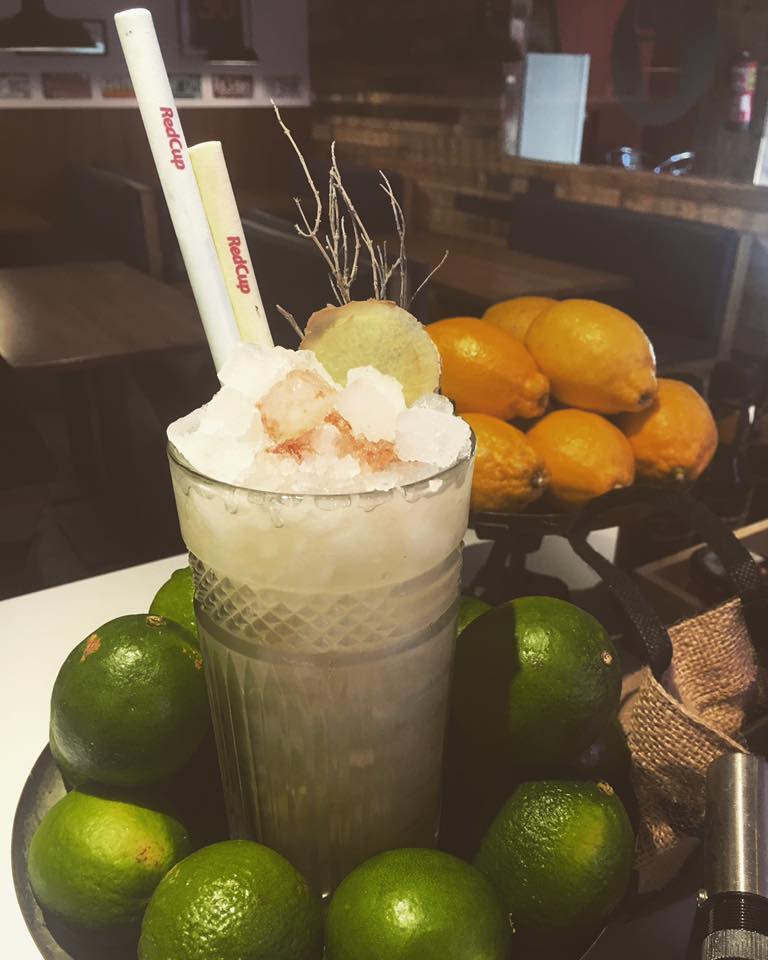
Can you imagine eating the straw in your gin and tonic? It may seem like a strange idea, but it is now possible thanks to a recently created company, Sorbos, located in Franqueses del Vallès. Its founder, the young entrepreneur and bartender for the past 10 years, Víctor M. Sánchez, has created an edible straw that comes in different flavours to accompany our favourite cocktails. At the same time, it avoids wasting plastic, as the material it is made of is far more sustainable. And not only that, but the straw also serves as merchandising for certain brands, such as NH Hotels or Maserati, and bears the companies' names.
"Sorbos was born out of the restaurant world for the restaurant world, with the aim of offering added value in terms of the product and responsibility towards the environment. Our aim is to spread this awareness of sustainable development while offering an experience to the end user," says its creator. Trained in criminology, Sánchez was working as a Brand Ambassador for a multinational distributor of spirits when he got the idea of creating an edible straw with the flavour of one of the gins he was promoting. He explained his idea to his workmate, Enric Juvina, and together they embarked on the project.
A group of food engineers then developed the ideal formula for Sorbos' purposes, with the right rigidity, durability and stability, without either the colour or flavouring of the straws tainting the drink, but which was also economically viable. Once the formula was patented, with an Italian company they created an industrial machine to produce the product.
The company set up in a joint space for firms in Franqueses, where there was a small workshop adapted to food production and where the transport links were ideal. Today, there are seven workers in the factory, five direct external employees and 10 external contributors with many different profiles: commercial, financial, factory technicians and industrial engineers.
The perfect cycle
The name Sorbos is no accident. "We were looking for an intuitive concept that people would remember. We played on the 'O' of Sorbos and the image of a glass seen from above and a point symbolising a chewed straw. On the other hand, Sorbos defines the function of the product, which is to suck," says Sánchez. And Sorbos is a unique concept on the market.
For the first time, a biodegradable, edible and flavoured straw that does not taint the taste of the drink has been made. "In the hostelry sphere we achieved what is known as the 'perfect cycle': all the elements inside the glass are aromatic and edible," says the founder. Once the cocktail is finished, the client can eat the straw, which has the same taste as the drink, as if it acted as a sponge.
 |
| The straws created by Sorbos are made of sugar. Ceded |
Sorbos' straws have 23 calories and are made of sugar. There is a choice of seven flavours: strawberry, lime, lemon, ginger, cinnamon, green apple or neutral. The product, which is available at the company's online shop for a minimum purchase of 200 units, can be used with all types of drinks, room temperature or chilled, and keeps the properties of a normal plastic straw for 25 minutes. After that it begins to soften and has to be eaten.
A positive evolution
Since Sorbos was born it has undergone a constant evolution as far as sales are concerned. "We are closing deals, both on the national and international level, with distribution companies that export and import. The reception has been really good, from our direct clients, because of the product's price, and from the end user, due to the added value it brings," says Sánchez. Considering that they began sales four months ago, the evolution has been "very positive", in his words. The intention in the short term is to triple turnover.
So far, they have won the Pascual Startup Prize. "We entered and were selected as finalists for the national competition from more than 270 companies. We were overjoyed to win in the environment category," he says.
Since its appearance, Sorbos has been improved, especially its packaging, with it now being individually packaged, with the colour, name and the taste printed on the outside. As for the range of flavours, they are developing new ones and by the summer hope to have lactic and tropical flavours. "Our R&D department continually works to improve the product and is researching new lines with the same concept: offering added value to hostelry while respecting the environment," says Sánchez.
